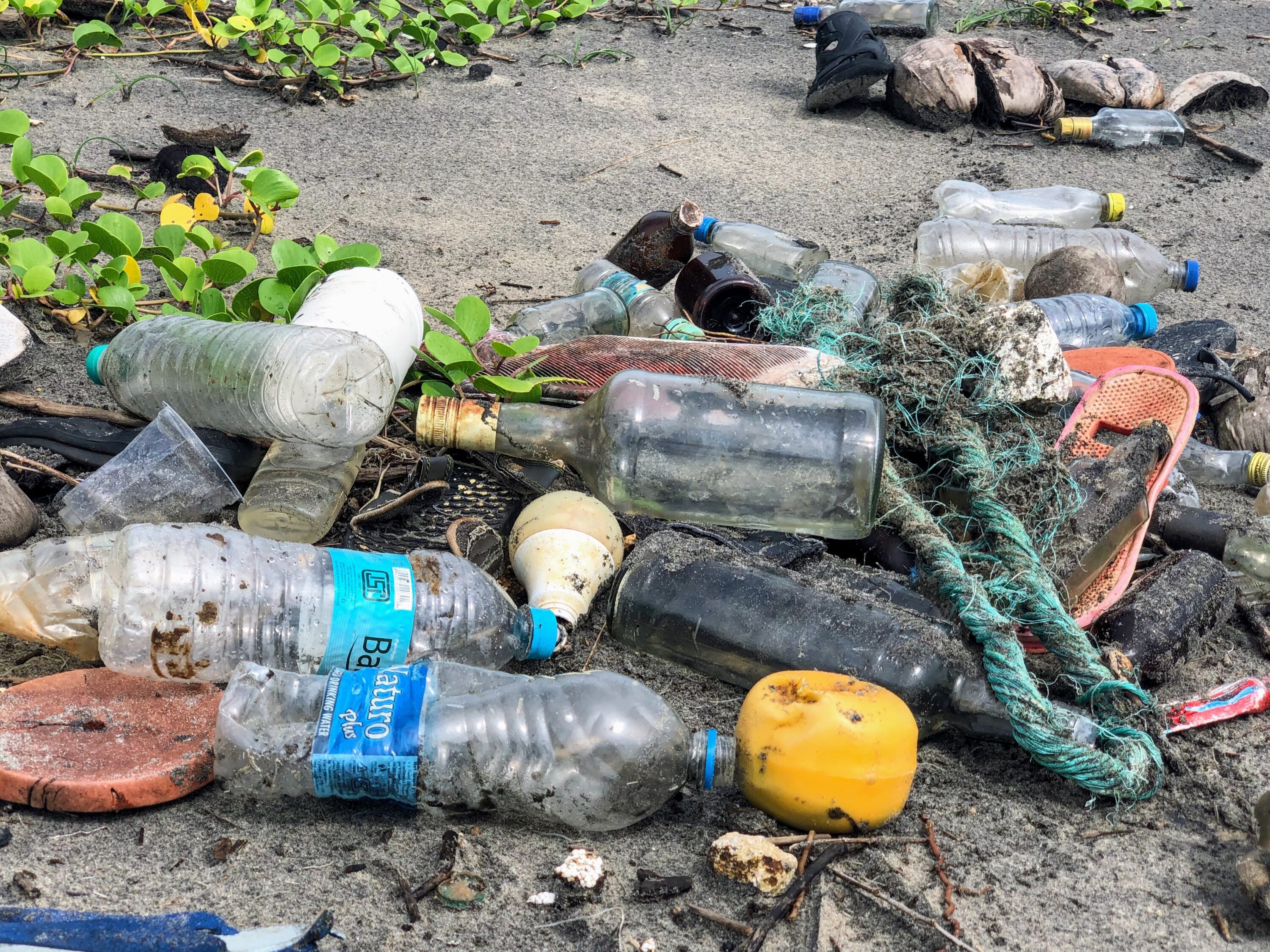By Lisa Song
This story was originally published by ProPublica. ProPublica is a Pulitzer Prize-winning investigative newsroom. Sign up for The Big Story newsletter to receive stories like this one in your inbox.
The plastic crisis has grown exponentially. Despite marketing claims, less than 10% of the plastic waste from recent decades has been recycled. The rest gets incinerated, is buried in landfills or piles up as litter on land and in the water.
Today, it is widely acknowledged that everything about plastic — from extracting fossil fuels to make it, to manufacturing products that use it, to disposing of it — can seriously harm public health and the environment. Plastics are a growing driver of climate change. As growth in renewable energy threatens the rule of fossil fuels, that industry is clinging to the creation of new plastics as its Plan B.
Now, the plastics industry faces a new threat. World officials will gather at a United Nations meeting in November to start negotiating the text of the first legally binding treaty on plastics. A final version is expected next year. If the agreement limits plastic production or use, the implications for the businesses that rely on it could be enormous.
So it wasn’t a surprise when those businesses sought to influence the discussion. But what has been jarring to environmental advocates and scientific researchers is who has been there to boost the Big Plastic platform: the United Nations itself, along with other globally respected groups.
This dynamic is evident right now in New York City, as global leaders, business executives and climate activists convene for Climate Week, an annual gathering organized by the nonprofit Climate Group in partnership with the United Nations.
Event organizers granted an opening ceremony speaking slot to a senior partner at McKinsey & Company, the powerhouse consulting firm that has advised fossil fuel companies. Top event sponsors include major brands that rely on plastic packaging and associate members of the American Chemistry Council, a leading plastics lobby.
“Our position on climate change and the urgent need to reach net zero is unequivocal, and we have been backing up those words with action for decades,” a McKinsey spokesperson said in an email. The American Chemistry Council didn’t return requests for comment.
A Climate Group spokesperson defended the inclusion of McKinsey and major plastics brands. “We won’t tackle climate change by only speaking with businesses or governments who are top performers. We need to engage with those who have further to go still.”
To those hoping for a strong plastics treaty, one of the most disappointing developments came from a report published by the United Nations Environment Program this May.
Co-written with Systemiq, a consulting firm that has advised the fossil fuel and plastics industries, the report generated a flurry of media attention for the main takeaway: that the interventions it listed would reduce global plastic pollution 80% by 2040 compared with what otherwise would have happened.
But its authors did not consider feedback from a large group of independent scientists and suggested several solutions that are favored by industry.
The report was “written from a certain worldview” that reflects business interests, said Ewoud Lauwerier, plastics policy expert at the advocacy group OceanCare. He called the report “highly problematic” in a 33-point thread on Twitter (now X).
Critics say the United Nations report emphasized waste management over the most important intervention — limiting the creation of new plastic. It’s a tactic that oil-rich nations like the United States have used in efforts to weaken the plastics treaty.
Putting the focus on managing waste risks getting locked into a cycle where people have to keep producing plastic to feed those waste management systems, said Jane Patton, campaigns manager on the U.S. fossil economy at the Center for International Environmental Law. Some environmentalists have called for phasing out single-use plastics by 2040.
The report is “not a reflection of industry talking points and it did not involve industry players while formulating the narrative,” Llorenç Milà i Canals, the lead report author from the United Nations Environment Program, said in an email on behalf of his institution and Systemiq. Milà i Canals is an expert on assessing the environmental impacts of products from creation to disposal.
The report did not predict how total plastics production would change. It focused on “short-lived” plastic products like packaging, which make up about two-thirds of all plastic waste. The report said the listed interventions would decrease production of these plastics 9% by 2040 compared with 2020.
Much of the reduction would come through eliminating single-use plastic or using replacement materials like paper. But the report’s inclusion of other controversial solutions alarmed many advocates and scientists.
Chief among them is chemical recycling, which transforms plastic on a molecular level. Research has shown that the process sometimes requires more energy than making brand-new plastic. A Reuters investigation found the industry has struggled to make it work on a large scale. Baked into the report’s estimated reduction in plastic pollution is what it projected to be a massive expansion of the practice: a more-than eightfold increase over 20 years. That growth rate is based on work Systemiq did with The Pew Charitable Trusts that resulted in a peer-reviewed paper.
“There’s no evidence anywhere showing that chemical recycling is sustainable from an environmental perspective or an economic perspective,” said Bethanie Carney Almroth, an ecotoxicology professor at the University of Gothenburg in Sweden. She fears the report will encourage governments to invest in chemical recycling, locking them into a harmful practice.
Chemical recycling is “included only as a last resort” for situations where plastic waste can’t be eliminated or processed via traditional recycling, Milà i Canals said. Chemical recycling “may have a role to play,” but “of course reducing the size of the problem is the top priority.”
The Pew Charitable Trusts, in a statement, said that its study set out to analyze “all existing and emerging technologies” to “assess their maximum feasible growth over the next 20 years” The analysis acknowledged that chemical recycling is “controversial” and could only tackle 6% of the plastic waste by 2040, so it “certainly cannot solve the crisis on its own.”
Incineration is another point of contention. Some “sub-optimal solutions will be needed” for certain non-recyclable plastics, the United Nations report stated. One option is to continue the practice of burning plastic as fuel for cement kilns. Since many countries already have cement kilns, the authors wrote, it wouldn’t require new investment and could reduce reliance on fossil fuels.
“Plastic itself is a fossil fuel,” said Sedat Gündoğdu, a professor in the Faculty of Fisheries at Çukurova University in Turkey. He said the report didn’t pay enough attention to the toxic footprint of incineration, as there’s “no proper solution” for the dioxins and other carcinogens emitted by burning plastic.
Many countries will turn to this report as a basis for future policy, he said. If the United Nations Environment Program lists incineration as an option, the least it could do is describe minimum health and environmental standards, he added.
Milà i Canals said the report stated this method is “strongly discouraged” and the authors did not recommend building new kilns. “We accept that we could have been more explicit about the limits of this solution.”
The report also suggested some of the costs of incineration could be covered by plastic credits — programs where corporations can claim to neutralize some of their plastic use by paying people elsewhere to recycle, incinerate or otherwise clean up existing plastic pollution.
Experts accused United Nations officials of being naive for their endorsement of plastic credits, saying that such programs will only justify more production of plastic while at the same time harming residents near incinerators. They have “no idea what’s going on on the ground,” said Yuyun Ismawati, senior adviser of the Nexus3 Foundation, an environmental group in Indonesia.
Her organization worked with a community in Bali near a polluting plastic waste recovery facility. Waste processed by the plant was linked to plastic credits pursued by a subsidiary of Danone, the French yogurt brand. The advocates sent Danone letters in June describing “filthy acidic smells” from the plant and residents’ complaints of nausea and severe headaches. The letter also denounced Verra, an American nonprofit that registered the plastic crediting project. Verra has been repeatedly criticized for selling worthless carbon credits. ProPublica reported in 2019 on a Verra-managed carbon offset project where half of the forested area that was supposed to be preserved was cut down after a decade.
Representatives from Verra and Danone told ProPublica the Bali project never produced actual plastic credits, and they were working to address concerns on the ground. The Verra spokesperson said the nonprofit is updating its carbon offset rules in response to recent criticism.
The Danone spokesperson said more research is needed “to test the effectiveness of plastic credits, and we continue to explore various solutions for plastic recycling.”
Milà i Canals said his report “does not provide a blanket recommendation” for plastic credits and cited references that warned of risks.
The United Nations Environment Program received notes on all of these concerns before publishing. It invited comments.
Since last year, the Scientists’ Coalition for an Effective Plastics Treaty — a group of 280 scientists from 55 countries — has volunteered its time to provide technical assistance on the treaty. In early March, the United Nations Environment Program sent out a draft of the report to representatives of the group, giving them a week to review the 80-page document. Thirty scientists from different countries dove in. Carney Almroth, the professor from Sweden, spent the weekend typing at her kitchen table on a shared document.
Their final submission contained more than 300 comments about the report’s general framing and critiques of specific paragraphs. “Many solutions that have been presented (e.g. different forms of recycling) have failed, or are not scalable, or were pure greenwashing campaigns from the start,” she wrote in one comment.
Their feedback fell into a virtual black hole. The final report didn’t alleviate their main concerns, Carney Almroth said, even though it was published two months after the comments’ submission.
Milà i Canals said the email was filtered to a spam folder. Everyone was so busy that “nobody noticed” the “unfortunate mistake” until the report was published, he said.
They did take other people’s comments into account, Milà i Canals explained. In total, the authors received more than 1,000 comments from 75 external experts working for civil society groups, academia, industry and government, he said.
Our comments had the potential to “reshape the whole report,” and that’s “not something the industry wants,” Gündoğdu said. He and others said the United Nations program should have done more to vet Systemiq before hiring them.
Milà i Canals said Systemiq is a “mission-driven” company that was founded to help achieve the United Nations Sustainable Development Goals and the Paris climate agreement, “and it does this by transforming markets and business models.” He cited Systemiq’s “excellent track record” analyzing plastic, including the firm’s prior work with his institution, academic researchers and Pew.
According to its website, Systemiq is “a collaborative system designer, developer and disruptor” striving for “a thriving planet where sustainable economic systems drive prosperity for all.” It was founded in 2016 by consultants with decades of experience working for McKinsey.
Like McKinsey, Systemiq has advised the fossil fuel sector. Yoni Shiran, the lead Systemiq author of the United Nations report, said the firm has done so “very rarely” and only to “help them move away from fossil fuels.” A 2022 Systemiq report written for Plastics Europe, an industry trade group, described how to reduce the environmental footprint of the most commonly used types of plastic, which make up 75% of all plastic. Aggressive policy changes could keep the amount produced from rising between 2020 to 2050 in Europe, the report predicted. (A spokesperson for Plastics Europe said it was an “independent report” advised by a steering committee of experts working in the public sector, civil society and industry.)
The United Nations report lists 17 lead authors: eight from the United Nations program, five from Systemiq, and four from a university and another consulting firm. Two of the Systemiq authors previously worked for McKinsey.
On Tuesday, Systemiq will release a new report, titled “Towards Ending Plastic Pollution by 2040.” It was commissioned by the Nordic Council, a regional parliament. Many of these countries are part of a “High Ambition Coalition” that seeks aggressive terms on the plastics treaty.
A spokesperson for the Nordic Council said the group was “very aware” of the criticism received by the United Nations report, adding that “many of those concerns” were taken into account and “addressed more directly” in the new report.
An early copy provided to reporters shows that the report predicts total plastic production will increase by 9% in 2040 compared with 2019. Without the suggested interventions, the report said, production in 2040 would balloon by 66%. Shiran, one of the lead authors, said 9% “actually represents a pretty ambitious reduction” since the United Nations predicts world population will grow by 2 billion in 2040, with rising plastic consumption per capita.
The report didn’t mention plastic credits and presented scenarios with and without large growth in chemical recycling. Shiran was also a lead author on the Pew and Plastics Europe reports.
Experts said these repeat publications create a loop in which reports cite and legitimize one another.
If you have one consultancy that’s constantly self-referencing its own work, it doesn’t expand our knowledge or prove their case, said Patton, the Center for International Environmental Law advocate. If an environmental group had this much influence, she added, “I would absolutely have the same concerns.”
Shiran said the models underlying each report took years of work and took feedback from expert panels made up of academics, government officials and civil society groups. The reports are “intentionally linked to build on previous knowledge,” he said. “This is a strength of the work, not a weakness.”
ProPublica is a Pulitzer Prize-winning investigative newsroom. Sign up for The Big Story newsletter to receive stories like this one in your inbox. Republished with Creative Commons License (CC BY-NC-ND 3.0).







